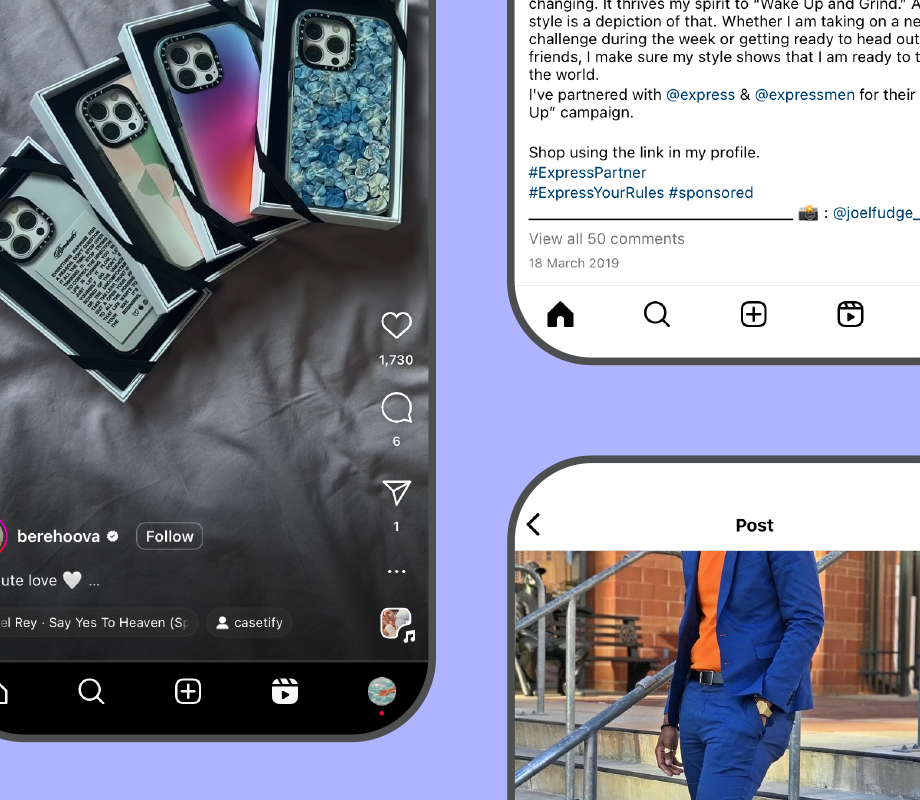With more than 2.3B monthly active users, Instagram is a hotspot for branded content.
And while one-off influencer marketing campaigns can be great for major launches, an always-on marketing solution is a good use of budget too.
Enter: Instagram affiliate marketing — the ultimate hack for cost-effective, continuous leads.
In this guide, we’re sharing what affiliate marketing is, why it works, and everything you need to know to make it a part of your strategy.
Table of Contents
What is Affiliate Marketing on Instagram?
Instagram affiliate marketing is a revenue sharing process where influencers earn a commission from the clicks or sales they generate for a brand on Instagram.
Influencers share a unique discount code with their audience or add a one-of-a-kind, trackable link to their Stories or the link in their bio.
And while Instagram's affiliate program ended in August 2022, influencers can continue posting affiliate content through third party programs on the platform.
FYI: Later Influence™ is a leading influencer marketing platform trusted by enterprise brands to source, manage, and analyze partnerships with Instagram influencers. Schedule a call now.
Why Should You Use Instagram Affiliate Marketing?
When it comes to Instagram affiliate marketing, the results speak for themselves. These are our top three reasons for getting started:
#1: Boost Brand Awareness
The math is simple: Niche experts casually promoting your brand over time = the perfect way to spread the word and build trust with your target audience.
#2: Enhance Social Proof
According to data from Statista, nearly 70% of online shoppers read between one and six reviews before making a purchase.
Couple that with the fact that 49% of consumers depend on influencer recommendations, building a rapport with an influencer’s audience is a no-brainer.
#3: Save Money
Affiliate marketing is performance-based, meaning influencer partners are only paid when they generate a sale or click.
The result? More money to invest back into your marketing strategy.
How to Launch an Instagram Affiliate Marketing Program
Ready to launch your Instagram affiliate marketing program? Here are seven simple steps:
#1: Determine Your Goals
Before you kick off your affiliate marketing program on Instagram, it’s essential to define your SMART goals and metrics.
What’s your ideal conversion rate for affiliate link clicks that lead to a sale?
How many clicks (or sales) do you want affiliates to bring in per month, quarter, and year?
This will help guide the kind of Instagram influencers you work with, the types of discounts you offer, and help you drive your strategy forward.
Ready to source Instagram affiliate marketers for your enterprise brand? Learn how with Later Influence, today!
#2: Scope the Competition
When it comes to creating a fruitful Instagram affiliate marketing program, don’t be afraid to take a peek in your own backyard for inspiration.
Making note of structure, pricing, and influencer partners, analyze the strengths and weaknesses of competitors’ affiliate programs in your industry.
What are they doing well? What can you do better?
#3: Choose Your Affiliate Network
While you can create your own affiliate program from scratch, affiliate networks are the best option for first-time programs.
Platforms like Rakuten, Pepperjam, and PartnerStack provide features like tracking technology, reporting tools, and payment processing.
Select the platform that best aligns with your goals, then choose your commission model:
Pay per click: The influencer earns a small amount for every click they drive to your website
Cost per acquisition: The influencer only earns when an actual sale is made
Our advice? If your focus is revenue (bottom of funnel), cost per acquisition is the way to go.
#4: Set Your Commission Rates
Once your Instagram affiliate marketing program is officially underway, it’s time to map out how much you’ll pay an influencer for each sale (or click) they drive.
There are a lot of different ways you can do this. Here are a few ideas:
Analyze your profit margins: Commission payments ultimately come out of your profit margin, so understanding how much profit you are willing to trade for a higher volume of sales is essential
Check your competitor notes: How much commission do your competitors pay out? What is the industry standard?
Ask your affiliate network: Affiliate networks have tons of experience and are likely to provide you with a wealth of information
NOTE: Once you’ve nailed your price, you’ll also need to set your payment terms. This is usually 60-90 days to allow for returns or exchanges, but will depend on your individual sales cycle.
#5: Create a Compelling Affiliate Program
You can’t reap the benefits of an Instagram affiliate marketing program if no one actually wants to participate in it.
The best way to incentivize? A tiered program with the option to unlock extra rewards.
Think: a higher commission rate for a higher volume of sales, or a one-off bonus payment.
It’s a short poem — you motivate influencers to promote your brand all while fairly rewarding them for the effort they put in.
#6: Find Influencers with Later Influence
Depending on your Instagram marketing goals, you may want to strategically hand-pick influencers to get the most from your affiliate campaigns.
With Later's influencer marketing services, real humans (not robots) will help find top creators that match your brand.
Plus, you can easily manage multiple campaigns all in one spot. Schedule a call today to learn more.
#7: Analyze & Adjust
Once your affiliate program is up and running, it’s important to keep track of what’s working, what’s not, and adjust.
Are influencers properly representing your products and brand? What is your return rate? Which influencers are generating the most sales?
Dig into the detailed reporting provided by your affiliate network to reveal how many affiliate links have been generated for your brand, the amount of clicks driven, and the total sales value.
NOTE: We recommend tracking and analyzing your affiliate marketing data on a monthly basis to keep a pulse on your program.
4 Instagram Affiliate Marketing Examples
Need some extra inspiration to create your next affiliate marketing program? Look no further:
#1: LTK
Formerly rewardStyle, LTK (LIKEtoKNOW.it), has more than 200K curated creators (and counting) promoting their favorite brands.
The concept is simple: influencers create shoppable posts of their OOTDs, home finds, and beauty essentials, and their followers can add to cart — all in one place.
#2: Express
Retail clothing brand Express offers cash rewards and points in exchange for fresh looks, proving affiliate marketing is very much in style.
Learn how Later helped scale Express’ program by 11x: How Express Ambassador Program Drove 168% ROI In Sales
#3: Casetify Affiliate Program
The sustainable and protective phone case brand Casetify offers a two-in-one deal for influencers who tap into their affiliate program.
Free cases to promote to their followers and a commission for the sales they drive. Win-win.
#4: Amazon Associates
If you’re an avid Reels consumer, you’ve probably seen a fair share of Amazon storefronts.
Amazon’s affiliate marketing program, “Amazon Associates” allows affiliates to create a shoppable feed of their favorite Amazon finds.
Creators drive traffic to Amazon products linked in their bio and are rewarded for the sales they drive.
And there you have it — everything you need to know to create a standout Instagram affiliate marketing program.
With these nuggets of golden information, your brand awareness and leads are bound to be on a lasting, steady incline.
FYI: Later's influencer marketing platform is trusted by enterprise business to discover creators, manage campaigns, and more. Schedule a call to launch your affiliate marketing program today.




